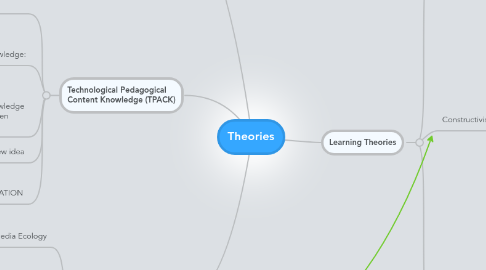
1. Technology Theories
1.1. Media Ecology
1.1.1. Technology influences humans and society
1.1.2. Our understanding of media is as an environment
1.2. Social Construction of Technology (SCOT)
1.2.1. human action and society that shapes technologies as they are developed
1.2.2. the ways a technology is used cannot be understood without understanding how that technology is embedded in its social context
1.2.3. a methodology: it formalizes the steps and principles to follow when one wants to analyze the causes of technological failures or successes.
2. Technological Pedagogical Content Knowledge (TPACK)
2.1. attempts to identify the nature of knowledge required by teachers for technology integration in their teaching
2.2. three primary forms of knowledge:
2.2.1. Content (CK)
2.2.2. Pedagogy (PK)
2.2.3. Technology (TK)
2.3. emphasizes the new kinds of knowledge that lie at the intersections between them
2.4. a brand new idea
2.5. IMPLICATION
2.5.1. other scholars have argued that that knowledge about technology cannot be treated as context-free, and that good teaching requires an understanding of how technology relates to the pedagogy and content.
3. Technology Philosophy
3.1. a teacher’s personal philosophy about how they use technology as a teaching tool
3.2. technology can be used to investigate the art of content and the science of operating interfaces
3.3. allows access to diverse skills and knowledge across the classroom
3.4. allows text we create as opportunities to situate ourselves in a larger world
4. Learning Theories
4.1. Connectivism
4.1.1. Learning and knowledge rests in diversity of opinions
4.1.2. Learning is a process of connection information sources
4.1.3. Maintaining connections is needed to facilitate continual learning
4.1.4. Learning occurs as part of social network
4.1.5. IMPLICATION
4.1.5.1. Personal knowledge management vs. organizational knowledge management
4.2. Constructivism
4.2.1. Learners create knowledge as the attempt to understand their experience
4.2.2. Learners attempt to create meaning
4.2.3. Learners often select and pursue their own learning
4.2.4. Learners build new knowledge on the foundation of previous learning
4.2.5. Prior knowledge influences the new knowledge that learners will construct
4.3. Cognitive Load
4.3.1. Knowledge is viewed as symbolic representation committed to memory
4.3.2. Long-term memory is virtually unlimited and assists the working memory
4.3.3. Repetition, Repetition, Repetition
4.3.4. IMPLICATION
4.3.4.1. If nothing has been altered into long-term memory then nothing has been learned
4.3.4.2. Overload occurs when the learner is given to much information too fast
4.3.4.3. At times there is limited space in working memory
